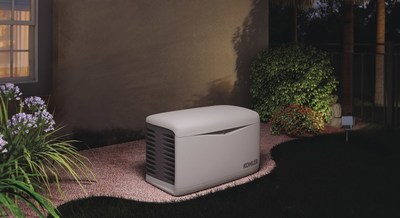Kohler Generators offers tips for keeping your home and family safe during an extended power outage
KOHLER, Wis., June 7, 2016 /PRNewswire/ -- The 2016 Atlantic hurricane season has arrived, which serves as an important reminder to homeowners about the importance of emergency planning. Land-falling tropical storms or hurricanes can pack a powerful punch, so now's the time to mitigate the damage by prepping your home and family for the upcoming hurricane season.
"In addition to developing a storm survival kit and stocking up on non-perishable food and water, your hurricane preparedness plan should also account for life without power," said Ed Del Grande, a home improvement expert and nationally syndicated columnist. "Extended power outages in the home are a common by-product of tropical storms with some outages lasting for days, even weeks."
The power experts at Kohler Generators have developed a list of important things you can do to ensure the safety and security of your family and home during extended outages.
- Your smartphone contains important contact information and phone numbers. Be sure to keep those numbers on a piece of paper in the event that your phone loses power.
- Turn off major appliances such as water heaters, stoves and air conditioning units. Unplug other appliances such as TVs, stereos, microwaves and computers. This will prevent damage to appliances and possible overloads to the system when power is restored.
- Leave one light on so you will be able to see when power is restored to your home.
- Ditch the candles for battery-powered flashlights or lanterns. Keep plenty of extra batteries on hand.
- Stay away from fallen wires, flooded areas and debris. Treat all down wires and anything touching them as though they have electricity flowing through them.
- Do not connect portable generators directly to the electrical system of your home. Electricity could flow backward into the power lines and endanger lives. Either have a qualified electrician install a manual transfer switch or plug appliances directly into the portable generator.
- If you're running a portable generator, be sure to use properly rated extension cords (outdoor, electrical load and length). Also, make sure the portable generator is properly vented to avoid carbon monoxide poisoning. Do not place a portable generator in your home or an enclosed space with limited ventilation like a garage or a screened porch.
- Inspect the area around your electricity meter. If you detect or suspect any damage, call your local utility provider.
- Familiarize yourself with your main electrical panel. You may have to turn off the main breaker or have to reset circuit breakers after an outage.
- Consider installing a commercial-grade, automatic generator for your home. An automatic generator (aka standby generator) turns on automatically when the power shuts off and is permanently installed outside the home similar to a central air conditioning unit. It runs on natural gas or propane and hooks up to existing fuel lines in your home. A transfer switch constantly monitors utility power and transfers the electrical load to the generator if power is lost, protecting the home even if the homeowner is away. A standby generator can power critical and sophisticated appliances and systems in your home, including lights, heating/cooling systems, refrigerators, sump pumps, home security systems and more.
To determine if a standby generator is right for you, Del Grande recommends doing your homework and looking for a unit that offers some of the following:
- A commercial-grade engine that provides clean, consistent power, handles heavy loads and powers up quickly.
- Make sure to purchase a standby generator with a minimum five-year warranty.
- Looks matter. A standby generator sits outside your home, so purchase a unit with a bold, clean look that is corrosion resistant.
- Some units have remote monitoring/operating capabilities via computer, tablet or smartphone. This is important for those who spend time away from home.
If you need help jump-starting your hurricane preparedness planning, go to Ready.gov or FLASH.org for useful tips and resources. To learn more about standby power – and to determine what size generator is best suited for your needs – visit www.KohlerGenerators.com.
Photo - http://photos.prnewswire.com/prnh/20160607/376605
To view the original version on PR Newswire, visit:http://www.prnewswire.com/news-releases/kohler-generators-offers-tips-for-keeping-your-home-and-family-safe-during-an-extended-power-outage-300281117.html
SOURCE Kohler Generators

Source: PR Newswire
(June 7, 2016 - 3:44 PM EDT)
News by QuoteMedia
www.quotemedia.com







